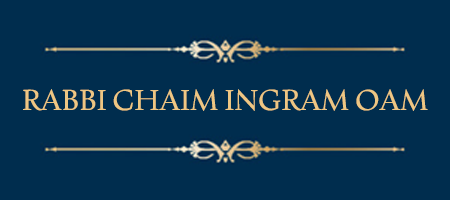ACUTE ANGLES: Is Tai Chi Kosher
ACUTE ANGLES
Real Questions on Jewish Thought Answered
An Occasional Series – 28
By Rabbi Chaim Ingram OAM
IS TAI CHI KOSHER?
Dear Rabbi. My friend who, like me, is newly-retired and Orthodox, told me she had recently enrolled in a weekly tai chi class. I asked her if she had consulted her rabbi about it and she said no, why should she have? I told her that its origins were steeped in Eastern religions, and that she would do well to check. She asked me to inquire on her behalf. So, rabbi, is tai chi kosher? Yours, Stella K.
Dear Stella,
It is very good that you thought to ask. Most Jews, even Orthodox ones, don’t even realise there’s an issue here, and potentially a very serious one at that.
Tai Chi, as well as yoga, reiki and the like, are rooted in Far Eastern religious practices. Yoga is intrinsically bound up with Hinduism and is also linked to Buddhism while Tai Chi is rooted in Taoism. These religions are, of course, strictly off-limits to Jews as they constitute avoda zara (idolatry). Moreover the very names tai chi and yoga as well as the Chinese symbols in reiki are derived from these impure sources. To qualify as an accredited yoga teacher in the west, the “Yoga Alliance” requires trainees to spend a minimum of thirty hours learning about “yoga philosophy, ethics and lifestyle” which includes submerging oneself in a series of alien religious texts (for example The Hatha Yoga Pradipka or Bhagavad Gita).
Ironically these practices may have Abrahamitic origins. We are told in Genesis chapter 25 that after Sarah died, Abraham married Ketura (whom the Midrash identifies as Hagar) and bore to her six sons. Before he died, Abraham “gave [them] gifts and sent them … to the lands of the Far East” (25:6) (This would appear to be a highly plausible rendition of the otherwise-tautological Hebrew phrase keidma el erets kedem – literally “eastwards to the lands of the east”).
The Talmud (Sanhedrin 91a) is puzzled as to the nature of these “gifts” as the previous verse had stated: “Abraham gave all that he had to Isaac”. The Talmud concludes that these were not tangible gifts. Rather the gifts he gave over to them were shem tum’a, “the knowledge of impure (unholy) utterances”. Rashi explains that he imparted to them the secrets of the impure arts, i.e. witchcraft and spiritualism.
Why would Avraham have imparted such knowledge to his sons? Gur Aryeh, a super-commentary on Rashi penned by the famed Maharal of Prague (d.1609), explains that it was in order to equip his sons to counteract the untoward effects of sorcery and to exorcise demons which may enter humans. (Many of the Talmudic sages were also knowledgeable in the occult arts. It is forbidden to practise them but not prohibited to learn about them to protect oneself.)
It is well-known that the Ramban (unlike the Rambam) believed that there was substance to witchcraft and sorcery. They are, he teaches, strictly forbidden avenues for Jews to access as they are impure methods of accessing the Divine.
With regard specifically to tai chi it would appear that its fundamental tenet is the practising of movements corresponding to some sort of unified connection with the internal energy that exists within the body, termed in the Far East as “Qi” or “Chi”. This squares with the general belief among Eastern religions in a “universal energy” which runs the world. It is this upon which one is meant focus, concentrate and bond in authentic tai chi as if this universal energy has the power to heal. For the Jew, of course, this positive energy undoubtedly exists – but it is placed there by an omnipotent Creator.. For the orthodox Tai Chi practitioner the energy itself is the ultimate source of all power.
Any reference to this impure energy by means of names, symbols and chants associated with tai chi, chi kung, yoga etc. including these names themselves as well as allied practices which are rooted in avoda zara (idolatry) would appear to make participation for a Jew impossible according to halacha.
However if one were to learn and practise the movements and techniques in a context that is totally devoid of any such names, symbols and chants, the only intent being physical wellness – or in the case of kung fu, expertise in self-defence – this would appear to be acceptable.
Please note that I am not a posek (adjudicator on questions of Jewish law) and these observations are intended as general guidelines only. Having said that, no recognised posek in the Orthodox world has approved participation in authentic tai chi. Gutman Locks, a former guru and expert in Hindu teachings and practices before returning to Judaism, now a Chabad rabbi residing in the rova, is certainly qualified to determine, and he clearly identifies these disciplines as avoda zara. I have also read that renowned international Torah exponent Rabbi Zev Leff, having once cautiously permitted these practices for Jews, changed his view upon being apprised of their details.
So good luck to your friend in finding a kosher class. Maybe she already has struck lucky! But remember that even merely calling it a tai chi class is a big problem!
